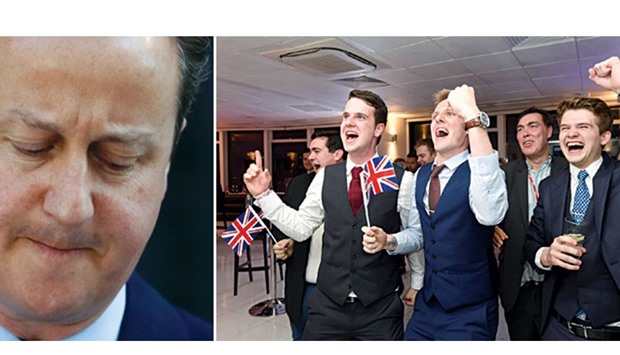Britain has voted to leave the European Union, forcing the resignation of Prime Minister David Cameron and dealing the biggest blow since World War Two to the European project of forging greater unity.
Global financial markets plunged yesterday as results from a referendum defied bookmakers’ odds to show a 52-48 % victory for the campaign to leave a bloc Britain joined more than 40 years ago.
The pound fell as much as 10% against the dollar to touch levels last seen in 1985, on fears the decision could hit investment in the world’s fifth-largest economy, threaten London’s role as a global financial capital and usher in months of political uncertainty. The euro slid 3%.
World stocks saw more than $2tn wiped off their value although Britain’s FTSE 100 stock index recovered much of its early losses.
US stocks fell sharply, with the Dow Jones industrial average dropping as much as 538 points.
The United Kingdom itself could now break apart, with the leader of Scotland - where nearly two-thirds of voters wanted to stay in the EU - saying a new referendum on independence from the rest of Britain was “highly likely”.
An emotional Cameron, who led the “Remain” campaign to defeat, losing the gamble he took when he promised the referendum in 2013, said he would leave office by October.
“The British people have made the very clear decision to take a different path and as such I think the country requires fresh leadership to take it in this direction,” he said in a televised address outside his residence.
“I do not think it would be right for me to be the captain that steers our country to its next destination,” he added, choking back tears before walking back through 10 Downing Street’s black door with his arm around his wife Samantha.
Quitting the world’s biggest trading bloc could cost Britain access to the trade barrier-free single market and means it must seek new trade accords with countries around the world.
A poll of economists by Reuters predicted Britain was likelier than not to fall into recession within a year.
The EU rose out of the ashes of two world wars, fascist and communist totalitarianism to unite a continent of democracies.
It faces economic and political damage without Britain, which has the EU’s biggest financial centre, a UN Security Council veto, a powerful army and nuclear weapons.
“It’s an explosive shock. At stake is the break up pure and simple of the union,” French Prime Minister Manuel Valls said. “Now is the time to invent another Europe.”
German Chancellor Angela Merkel, who invited the French and Italian leaders to Berlin to discuss future steps, called it a watershed for European unification.
Her foreign minister, who will with France present other EU founding members with a plan for a flexible EU today, called it a sad day for Britain and Europe.
The result emboldened eurosceptics in other member states, with French National Front leader Marine Le Pen and Dutch far-right leader Geert Wilders demanding their countries also hold referendums.
Le Pen changed her Twitter profile picture to a Union Jack and declared “Victory for freedom!”
The vote will trigger at least two years of divorce proceedings with the EU, the first exit by any member state.
Cameron, in office since 2010, said it would be up to his successor to formally start the exit process.
His Conservative Party rival Boris Johnson, the former London mayor who became the most recognisable face of the Leave camp, is now widely tipped to seek his job.
“We can find our voice in the world again, a voice that is commensurate with the fifth-biggest economy on Earth,” he told reporters at Leave campaign headquarters.
Lawmakers from the opposition Labour Party also launched a no-confidence motion to topple their leader, leftist Jeremy Corbyn, accused by opponents in the party of campaigning tepidly for its Remain stance.

Prime Minister David Cameron speaking after Britain voted to leave the European Union, outside Number 10 Downing Street in London yesterday. Leave supporters cheering results after polling stations closed in the Referendum on the European Union in London yesterday.
